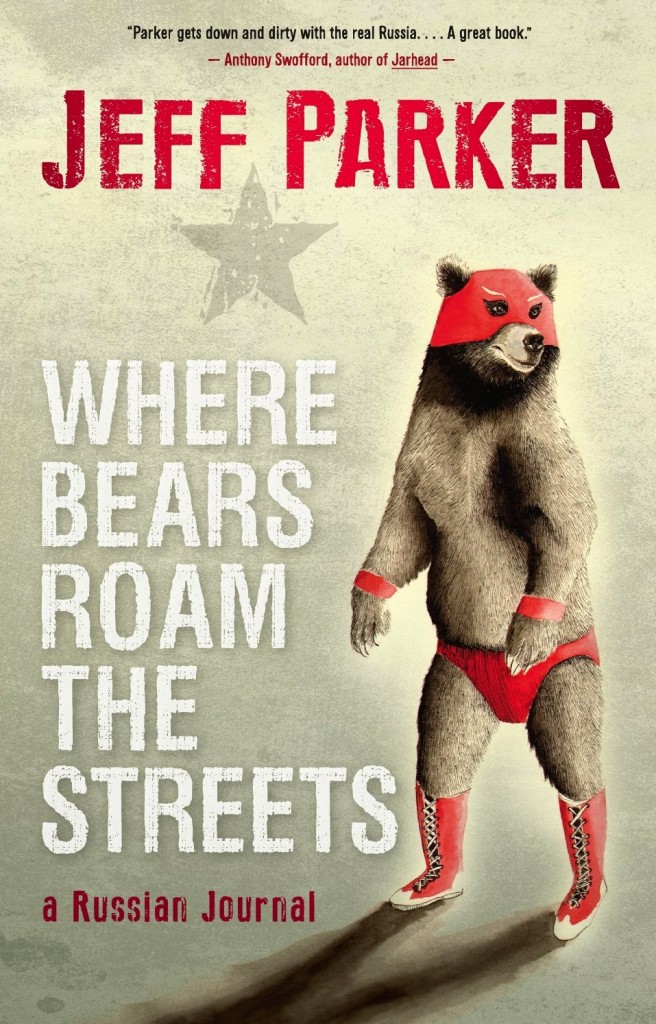At its core, Where Bears Roam the Streets aims to strike a balance between Thompson-esque madness and serious journalism. — Benjamin Woodard
Where Bears Roam the Streets
Jeff Parker
Harper Perennial
368 pages($16.99)
ISBN 978-1554683826
As an American child of the 1980s, three well-known figures essentially forged my understanding of Soviet Russia: Odessa-born comedian Yakov Smirnoff (“Why don’t they have baseball in Soviet Union? In Soviet Union, no one is safe!”); Ivan “I must break you” Drago, the fictional pugilist from the cinematic travesty Rocky IV; and former Soviet leader Mikhail Gorbachev (though, to be honest, most of my interest here surrounded the various jokes about his birthmark).
To say that I grew up in a non-political household would be an understatement. I was a child living in blissful ignorance of the outside world, and the U.S.S.R. was simply a place with funny rules, mean boxers the size of horses, and a leader as strange as our own Ronald Reagan.
Jeff Parker, in his energetic new journal/travelogue/memoir, Where Bears Roam the Streets, admits to a somewhat different childhood. Raised in north Florida, he writes that, while his family wasn’t “tuned in” politically during his childhood, he developed a fear of the U.S.S.R. thanks to nuclear attack drills during school hours, coupled with the 1983 TV movie The Day After:
After seeing the movie The Day After, which solidified in me the understanding that Russians were my enemy, I asked my mom if we could put in a below-ground fallout shelter.
Of course, Parker expanded his worldview as he aged. A budding writer, he found appreciation in Russian literature—Gogol, in particular—and in 1999, while in graduate school, he began visiting the nation regularly to work at the St. Petersburg Summer Literary Seminars. During his first summer abroad, he bonded with Igor, a walking tall tale of a young man, and their friendship bloomed. Until the Literary Seminars shuttered in 2008, Parker and Igor spent summers together, and when Parker was back home, the pair kept in contact via Skype. Then, in the summer of 2009, as Parker’s marriage slowly deteriorated and Igor found himself suddenly unemployed thanks to an economic collapse caused by Russia’s armed conflict in Georgia, the duo decided to spend the summer traveling. The point of the trek was twofold: to unwind, firstly, but also so Parker could write about the land that scared him so in his youth. The result—Where Bears Roam the Streets—is a fascinating volume, equal parts examination of Russia culture and rowdy road trip, that rarely stumbles in its bid to illuminate the highs and lows of modern Russian life.
The book oscillates in time and location, with chapters chronicling Parker and Igor’s travels (first to the Black Sea coast, then to Siberia to visit Parker’s estranged wife) interspersed with sections devoted to a wide variety of Russian curiosities—from matchmakers to political activists—as well as Igor’s wild past. These shifts occasionally feel abrupt, derailing some narrative flow, yet all are important to understand the actions taken by those Parker encounters. Tales from Igor’s history, especially his time in England, working for pittance while being “trained” as a manager for a British muesli plant set to open in St. Petersburg, establish the man’s skepticism. Further, a brief account of Igor’s multiple comical attempts (and eventual success) to evade military service in 1999 permit the persuasive, suave Igor of 2009 to seem all the more fathomable. This story of draft dodging also resonates in the larger world when juxtaposed with Parker’s visit with writer Denis Burov and Ilya Plekhanov, both former soldiers who fought in Chechnya. When Burov, who suffered from poverty and intense PTSD following his service, tells Parker, “Service is not a noble thing here in Russia, unfortunately…Now the common point of view is a real man has to buy his way out of the service,” it’s hard not to look at Igor’s charm and persistence with a bit of disgust. Through these somewhat unrelated incidents, his character rounds out, so that as his journey continues, we feel for his triumphs and defeats.
Likewise, such encounters also bring to light some of Parker’s own unease, serving to expand his persona:
I always felt guilty around guys my age who had gone to Iraq while I prowled bars and wrote my stories. And unlike Igor, I hadn’t swindled my way out of fate…Put in the same situation [as Igor], I’d have done everything in my power—I’d have paid much more than Igor for an X-ray showing a non-existent crack in my spine.
Here, another heartbeat of Where Bears Roam the Streets is exposed, for while Parker claims his book’s overall agenda is to further comprehend Russian life, time and again his explorations prove he’s also searching for a greater understanding of his own nature. After Igor tells Parker of his own psycholinguistic method of working out problems, the author finds himself testing the technique on his own woes. Likewise, Parker chastises Igor’s treatment of women, claiming his friend suffers from a “‘man is first’ mantra,” yet the author sometimes describe the females he encounters with a touch of male gaze (it should be noted, however, that Parker does devote large chunks of his book exposing some of the horrible injustices faced by many Russian women: unforgiving romantic expectations, physical and sexual abuse). It’s in moments like these that Where Bears Roam the Streets chronicles Parker’s psyche as much as that of the world around him, a general feeling echoed about halfway through the book when Parker writes, “I wondered at the Igor part of me. And the me-part of him…” As the two roll across the land, consuming vodka, sweating in banyas, and mulling life, there are certainly times when these “parts” blur.
Gary Shteyngart, in a blurb that appears on the back cover of Where Bears Roam the Streets, calls the book “A kind of Fear and Loathing on the Trans-Siberian Railroad,” and while such a catchy quote will certainly help move paper copies, it ultimately sells Parker’s ambition short. Yes, the total amount of alcohol consumed during the author’s escapades with Igor would leave lesser writers dead, and scenes of hosting celebrations full of fellow travelers while staying in Listvyanka contain a fair share of combustible energy, but to paint Jeff Parker’s latest as a Hunter S. Thompson imitation would be a massive disservice. At its core, Where Bears Roam the Streets aims to strike a balance between Thompson-esque madness and serious journalism. As Parker speaks to his subjects, both casually and in more formal interviews, he does so with the interest of a man who truly wants to learn, who truly hopes to grow from each experience, and as readers along for the ride, we are all richer for having experienced the world via his curious nature.
— Benjamin Woodard
Benjamin Woodard lives in Connecticut. His recent fiction has appeared in Cheap Pop, decomP magazinE, and Spartan. In addition to Numéro Cinq, his reviews and criticisms have been featured in, or are forthcoming from, The Kenyon Review, Publishers Weekly, Rain Taxi Review of Books, and other fine publications. He also helps run Atlas and Alice Literary Magazine. You can find him at benjaminjwoodard.com and on Twitter.


